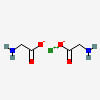Understanding Magnesium Glycinate: Benefits, Uses, and Safety
Magnesium glycinate is a popular dietary supplement lauded for its high bioavailability and gentle impact on the digestive system. This article dives into the details of magnesium glycinate, exploring its chemical properties, potential benefits, and safety considerations.
What is Magnesium Glycinate?
Magnesium glycinate is a compound formed by combining magnesium with glycine, an amino acid. It is available as a dietary supplement and frequently used to address magnesium deficiency.
- Molecular Formula: C4H8MgN2O4
- Molecular Weight: 172.42 g/mol
Key Features of Magnesium Glycinate
Magnesium glycinate stands out due to its enhanced absorption and reduced likelihood of causing gastrointestinal distress compared to other forms of magnesium. This is because glycine helps to transport magnesium across the intestinal wall.
Benefits of Magnesium Glycinate
Magnesium is an essential mineral involved in hundreds of biochemical reactions in the body. Magnesium glycinate offers a bioavailable way to reap its many benefits.
- Improved Sleep Quality: Glycine has calming properties that may promote relaxation and better sleep. Studies suggest glycine can improve sleep quality by helping individuals fall asleep faster and stay asleep longer.
- Enhanced Muscle Function: Magnesium is crucial for muscle contraction and relaxation. Adequate magnesium levels can help prevent muscle cramps and spasms.
- Bone Health: Magnesium plays a vital role in bone formation and maintenance. It helps regulate calcium and phosphate homeostasis, which are essential for bone growth and strength.
- Enzyme Activation: Magnesium activates over 600 enzymes and is essential for various bodily functions, including DNA and RNA synthesis and cellular repair.
Uses of Magnesium Glycinate
Magnesium glycinate is versatile and beneficial for various health concerns. It's even used in cosmetics!
- Addressing Magnesium Deficiency: As a highly bioavailable source of magnesium, this supplement effectively helps replenish magnesium levels in individuals with deficiencies.
- Supporting Nerve Function: Magnesium contributes to healthy nerve transmission and can help manage symptoms of nerve-related issues. Studies also suggest magnesium can help with anxiety and depression.
- Cosmetic Applications: Magnesium glycinate appears as a cosmetic ingredient, highlighting its versatile applications beyond supplements.
Safety and Potential Side Effects
Magnesium glycinate is generally considered safe for most people when taken as directed. However, it's essential to be aware of potential side effects.
- Gastrointestinal Issues: Although less likely than with other magnesium forms, some individuals may experience mild digestive issues such as diarrhea or stomach upset.
- Drug Interactions: Magnesium can interact with certain medications, including antibiotics and diuretics. Consult with a healthcare provider before taking magnesium glycinate.
- Dosage: It's essential to follow recommended dosages. High doses of magnesium can lead to adverse effects.
Is Magnesium Glycinate Right for You?
If you suspect you have low magnesium levels or are looking for a magnesium supplement that is gentle on the stomach, magnesium glycinate could be a good option.
Chemical Properties and Identifiers
For those interested in the more technical aspects, here's a quick rundown:
- IUPAC Name: magnesium;2-aminoacetate
- InChI Key: AACACXATQSKRQG-UHFFFAOYSA-L
- CAS Registry Number: 14783-68-7
Comparing Magnesium Glycinate to Other Forms
Magnesium comes in various forms, each with unique absorption rates and effects. Compared to magnesium oxide, which has lower bioavailability and is more likely to cause laxative effects, magnesium glycinate is better absorbed and gentler on the stomach. Other forms include magnesium citrate, magnesium chloride, and magnesium threonate.
Conclusion
Magnesium glycinate is a well-tolerated and effective form of magnesium supplementation that offers numerous health benefits, from supporting sleep and muscle function to promoting bone health. Understanding its properties, uses, and safety considerations can help you determine if it's the right choice for your needs. Always consult with a healthcare professional before starting any new supplement.



%3Amax_bytes(150000)%3Astrip_icc()%2FGettyImages-1500286867-b1bd2c13d9f64f4faf4741ac385b03e0.jpg&w=3840&q=75)



